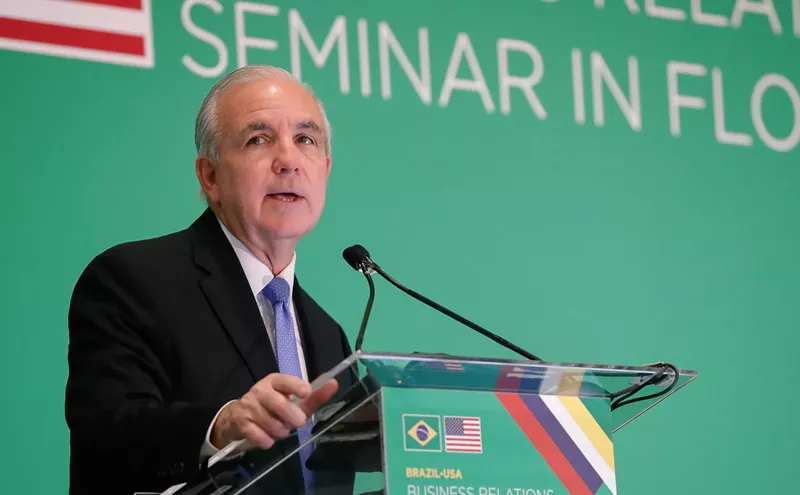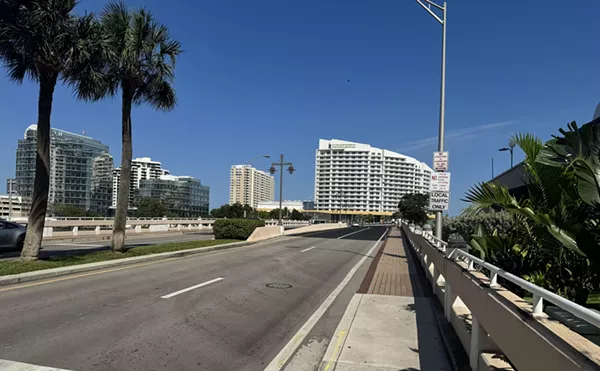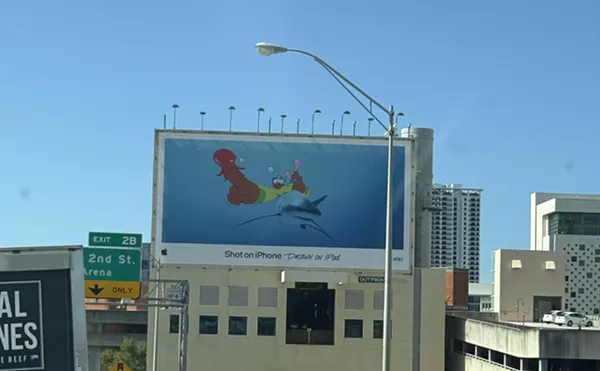Champagne bottles were popping, the bass was booming, and confetti was flying as rapper French Montana performed at Story nightclub. The dance floor stayed packed shoulder-to-shoulder while the liquor flowed, seemingly business as usual at the Miami Beach venue just ten days ago.
The club is now eerily quiet — shuttered until further notice as its future hangs in the balance in light of a 2 a.m. liquor curfew instituted in Miami Beach's South of Fifth District.
The curfew kicked in last week after a judge's 30-day stay expired in the club's court battle with the city.
Unless Story's lawyers can pull out a Cinderella victory on appeal to overturn the curfew, EDM-hungry clubgoers on South Beach might need to find another venue in which to shake their booties. Amnesia International, the club's owner, has indicated that the curfew is a death knell for the venue, as the majority of its revenue comes after 2 a.m. when parties are at their peak and headliners are performing.
"Cities are not czars. They are not empowered to go door to door determining the fate of each business in their jurisdiction," the club's attorney John Crabtree argues in his brief to the appeals court.
Story claims it will "indisputably be put out of business" if the ordinance is upheld. A club spokesperson tells New Times the club will remain closed pending the appeal.
If Story is shuttered for good, it would mark the end of an era for the famed nightclub destination on Collins Avenue.
The clubbing hotspot got its start under the brand Amnesia in the early 1990s. Hip-hop and early incarnations of house music could be heard blasting during that heyday of the Miami Beach club scene. Lesley Abravanel, a political columnist and Miami Herald alum who used to cover Miami Beach's nightlife scene, describes Amnesia in the '90s as "unbridled hedonism from the children of the night born a bit too late for Studio 54."
The venue opened as Opium Garden in 2001 and became known as a hub for celebrities and glitzy parties in Miami Beach, portending its future under Story's polished, poppy business model
"As Amnesia gave way to Opium, it became a celeb-saturated scene-fest of A-listers, club kids, and curiosity seekers looking to dip their toes into the glittery, supersonic sandbox. Hey, look, is that Jennifer Lopez running away from Ben Affleck to the tune of DJ Hex Hector 'Let's Get Loud' remix? Yes, why yes it is. Er, yes it was," Abravanel tells New Times.
After operating under the Opium Garden and Privé monikers, the club in 2012 came under the wing of hospitality giant and LIV nightclub owner David Grutman, who along with his partner, Fontainebleau chairman Jeffrey Soffer, made the place into the decked out 27,000-square-foot mega-club that it is today.
In recent years, Story made its nut by booking popular EDM and hip-hop acts and coupling its bass-heavy shows with high-priced bottle service. DJ Khaled, Steve Aoki, and Hardwell were mainstays.
After years of neighbors complaining about partying in the area, the Miami Beach city commission in February passed the measure to move up last call for alcohol in the South of Fifth district from 5 a.m. to 2 a.m. Amnesia International immediately tried to block enforcement of the ordinance ahead of Miami Music Week, challenging it in Miami-Dade County court on the grounds that it was unconstitutional.
Citing the ordinance's exclusion of businesses with less than a 100-person capacity, the club argued the ordinance unfairly targets large venues. Moreover, Story cited comments made by Miami Beach commissioners during public discussions about the curfew, which revealed that Story was being singled out as the sole impetus for imposing the liquor restrictions, the club claimed.
Judge Reemberto Diaz ruled in March that the city could enforce the curfew, finding that the city had a legitimate government interest in regulating alcohol sales. But he granted a 30-day stay that gave the club and its employees some wiggle room. The stay allowed the venue to remain open during Spring Break and Miami Music Week, one of the most lucrative times of year for the bar.
On appeal in the Third District, Story says the commission put carveouts into the ordinance to "ensure Story's destruction while allowing the city's more favored venues to do business as usual."
"The city's goal in passing the ordinance — shutting down Story — was not a secret. The city’s own commissioners made that clear, stating that Story was the 'primary problem' and, thus that the 'real goal' of the ordinance was to get rid of Story," the club's brief says.
"A law that employs arbitrary, capricious, and discriminatory means to attain even a valid governmental goal is unconstitutional," Story's attorneys argue.
Miami Beach has not responded yet in the Third District.
Miami Beach Mayor Dan Gelber previously defended the ordinance and said that the South of Fifth district is a "residential neighborhood that should not have to endure 24-hour nightclubs."
"The ordinance implements the will of Miami Beach voters who voted in November 2021 in favor of rolling back alcohol sales hours to 2 a.m., while allowing the city to create exceptions as appropriate," Miami Beach's attorney Joseph Serota argued last month.
Soffer recently bought out the Story property for $23 million, with some speculating he has contingency plans to develop it in the event the curfew is upheld on appeal.

Audio By Carbonatix
[
{
"name": "GPT - Billboard - Slot Inline - Content - Labeled - No Desktop",
"component": "22004575",
"insertPoint": "2",
"requiredCountToDisplay": "2"
},{
"name": "STN Player - Float - Mobile Only ",
"component": "22595215",
"insertPoint": "2",
"requiredCountToDisplay": "2"
},{
"name": "Editor Picks",
"component": "17482312",
"insertPoint": "4",
"requiredCountToDisplay": "1"
},{
"name": "Inline Links",
"component": "18711090",
"insertPoint": "8th",
"startingPoint": 8,
"requiredCountToDisplay": "7",
"maxInsertions": 25
},{
"name": "GPT - 2x Rectangles Desktop, Tower on Mobile - Labeled",
"component": "23181625",
"insertPoint": "8th",
"startingPoint": 8,
"requiredCountToDisplay": "7",
"maxInsertions": 25
},{
"name": "Inline Links",
"component": "18711090",
"insertPoint": "8th",
"startingPoint": 12,
"requiredCountToDisplay": "11",
"maxInsertions": 25
},{
"name": "GPT - Leaderboard to Tower - Slot Auto-select - Labeled",
"component": "17720761",
"insertPoint": "8th",
"startingPoint": 12,
"requiredCountToDisplay": "11",
"maxInsertions": 25
}
]












